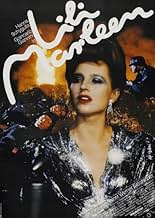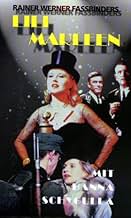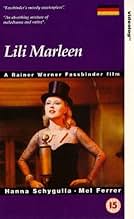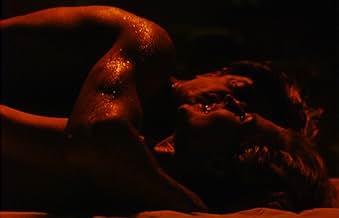IMDb RATING
7.1/10
4.6K
YOUR RATING
In 1938, a German singer falls in love with a Jewish composer in Zurich, who helps Jews flee Nazi Germany. She wants to help but is forced back to Germany. Her song "Lili Marleen" becomes a ... Read allIn 1938, a German singer falls in love with a Jewish composer in Zurich, who helps Jews flee Nazi Germany. She wants to help but is forced back to Germany. Her song "Lili Marleen" becomes a hit with soldiers and the Nazi top brass.In 1938, a German singer falls in love with a Jewish composer in Zurich, who helps Jews flee Nazi Germany. She wants to help but is forced back to Germany. Her song "Lili Marleen" becomes a hit with soldiers and the Nazi top brass.
- Awards
- 1 win & 4 nominations total
Karl-Heinz von Hassel
- Henkel
- (as Karl Heinz von Hassel)
Raúl Gimenez
- Blonsky
- (as Raul Giminez)
Featured reviews
10hasosch
Many critics have felt offended that R.W. Fassbinder has portrayed both protagonist Wilkie and the Nazis in this movie in a human-like manner. Connoisseurs of other Fassbinder films, however, will realize that "Lili Marleen" (1981) belongs to Fassbinder's "women movies" like "The Marriage of Maria Braun" (1979) and "Lola" (1981). Fassbinder was convinced that "stories can be told much better with women than with men", because, according to Fassbinder, while men usually fulfill their determined roles in society, "women are capable of thinking in a dialectic manner". Dialectics, however, means that there is not only a thesis and its antithesis like usually in our black-and-white world, but a synthesis where the oppositions coincide. Moreover, dialectic means that because of the third instance of synthesis the absolute opposition of the difference between thesis and antithesis is abolished. Concretely speaking: Starting from a dialect point of view and portraying the fascist state, the underground fighters must necessarily use the basic means like the rulers do, and between offenders and victims there is thus a chiastic relation, so that every offender is also victim and every victim is also offender. Fassbinder has illustrated this abstract scheme, that transcends classical logic, in his play "The City, the Garbage and the Death" (1975) which was filmed by Daniel Schmid under the title "Shadow of Angels" (1976).
Therefore, approaching an a priori controversial topic like Nazi Germany, in a dialectic manner, the depiction of this time in the form of a movie gets even more controversial, especially for people who cannot or do not want to see that our recognition of the world is by far not exhausted with a primitive light-switch schema, but needs the third instance of synthesis as controlling instance of its opposite members thesis and antithesis. The mutual relationship between offenders and victims has to scrutinized, since it is simply not true that the offenders are the bad ones and the victims the good ones. In a synthetic viewpoint, the bad ones participate on the goodness as the good ones participate on the badness. They are mutually related. In a world-view based on classical logic, a relation between good and bad cannot even been established, and in an ethics based on this insufficient system of logic, the bad conscience of the survivors of Nazi Germany, feeling (illogically enough) responsible for the deeds of their ancestors, exclude the possibility of a relationship between the two extremes and thus a synthesis in the form a new evaluation based on this relationship as well. From Fassbinder's dialectic viewpoint, it follows that neither Lili Marleen nor Lola nor Maria Braun can be condemned for their "misuse" of the ruling system for their private purposes, because they don't misuse them, they just use them. In the opposite, since victims must repeat the actions of the offenders as the offenders must repeat the actions of the victims, because "good" and "bad" are no longer simple mirror images of one another like in two-valued logic, their strategies are legitimated by the chiastic structure of a logic that describes our world, that is not black and white at all, much better than a black-and-white logic.
Therefore, approaching an a priori controversial topic like Nazi Germany, in a dialectic manner, the depiction of this time in the form of a movie gets even more controversial, especially for people who cannot or do not want to see that our recognition of the world is by far not exhausted with a primitive light-switch schema, but needs the third instance of synthesis as controlling instance of its opposite members thesis and antithesis. The mutual relationship between offenders and victims has to scrutinized, since it is simply not true that the offenders are the bad ones and the victims the good ones. In a synthetic viewpoint, the bad ones participate on the goodness as the good ones participate on the badness. They are mutually related. In a world-view based on classical logic, a relation between good and bad cannot even been established, and in an ethics based on this insufficient system of logic, the bad conscience of the survivors of Nazi Germany, feeling (illogically enough) responsible for the deeds of their ancestors, exclude the possibility of a relationship between the two extremes and thus a synthesis in the form a new evaluation based on this relationship as well. From Fassbinder's dialectic viewpoint, it follows that neither Lili Marleen nor Lola nor Maria Braun can be condemned for their "misuse" of the ruling system for their private purposes, because they don't misuse them, they just use them. In the opposite, since victims must repeat the actions of the offenders as the offenders must repeat the actions of the victims, because "good" and "bad" are no longer simple mirror images of one another like in two-valued logic, their strategies are legitimated by the chiastic structure of a logic that describes our world, that is not black and white at all, much better than a black-and-white logic.
I am terribly sorry, I know that Faßbinder still is called one of the greatest directors in post-war Germany and that most of his films are considered "master-pieces", but when I see "Lili Marleen" today, in 2004, I wonder what everyone is up and away about this movie! The acting is simply terrible - Hanna Schygulla is all the smiling like an idiot! -, the changings between Nazi-glamour and battlefields are ridiculous, the whole film looks as if it was made within two days in an attic. Probably it was exactly that way and many people seem to take this for "real art", but for me this movie is simply bad & cheap. Compare this to Viscontis "La Caduta degli Dei" and tell me again that "Lili Marleen" is a good movie...
Rainer Werner Fassbinder always made movies as if he knew his was on borrowed time. Many of the 44 films made by him in his 16-year career represent searches, experiments, attempts to express himself as an artist in the most diverse cinematic ways. 'Lili Marleen', made in 1981, the penultimate year of his life, belongs to a cluster of several films that are apparently less radical than most of the others and closer to mainstream cinema. After the success of some of his movies in previous years, Fassbinder was able to secure financing for more expensive productions with international casts and many extras. He chooses to make 'Lili Marleen', a story woven around the famous song that sounded in the trenches of the Second World War, both German and Allied (one of the famous versions belongs to Marlene Dietrich) and somewhat inspired by the autobiographical book of Lale Andersen, the German singer who first recorded the song on disc. Apparently, it is a melodrama that improbably embellishes her biography. In fact, we also find in this film the story of a woman who has to face alone the dark forces of the surrounding society combined with Fassbinder's sarcastic vision of the history of 20th century Germany.
The film's lead character, Willie, is a blonde, Aryan, German singer who doesn't seem to know or care much about what's going on in Germany in 1938. She performs in a cabaret in Zurich and falls in love with Robert, a wealthy young Jew, whose family is involved in the anti-Nazi resistance fight and in the rescue of the remaining Jews in Germany. Willie's father opposes the relationship and maneuvers so that the young woman cannot return to Switzerland after a trip to Germany. Forced to earn a living in Nazi Germany, Willie records the song 'Lili Marleen', which after the outbreak of war and the occupation of much of Europe and North Africa by the Nazis becomes a hit listened to by German soldiers and later by the Allies when they will disembark in Europe. The relationship between Willie and Robert continues, and the singer, forced to make artistic compromises and collaborate with the Nazis, begins to open her eyes and get involved in the fight against Nazism.
As in many of Fassbinder's films, the female characters are much stronger, more nuanced and better defined than the male characters. The lead role is interpreted by the exceptional Hanna Schygulla, Fassbinder's favorite actress. Her Willie is carefree at first, eager to live her life, a fighter for survival using her art and feminine charms as weapons. Above all, however, she is in love, but times of war crush destinies and love stories. Robert and his father are ambiguous characters and Fassbinder has been criticized for this, but also for nuancing the characters on the other side of the conflict, the Nazi officers. My opinion is that artistically the choice was appropriate, and the film must be seen from the director's sarcastic perspective, fascinated but also critical of the anti-cultural kitsch of 20th century Germany. As in many of his other films, Fassbinder also appears in a cameo role, as head of the anti-Nazi resistance, perhaps also to emphasize his personal position. 'Lili Marleen' is a film less appreciated by critics and Fassbinder experts. I consider it among his best films.
The film's lead character, Willie, is a blonde, Aryan, German singer who doesn't seem to know or care much about what's going on in Germany in 1938. She performs in a cabaret in Zurich and falls in love with Robert, a wealthy young Jew, whose family is involved in the anti-Nazi resistance fight and in the rescue of the remaining Jews in Germany. Willie's father opposes the relationship and maneuvers so that the young woman cannot return to Switzerland after a trip to Germany. Forced to earn a living in Nazi Germany, Willie records the song 'Lili Marleen', which after the outbreak of war and the occupation of much of Europe and North Africa by the Nazis becomes a hit listened to by German soldiers and later by the Allies when they will disembark in Europe. The relationship between Willie and Robert continues, and the singer, forced to make artistic compromises and collaborate with the Nazis, begins to open her eyes and get involved in the fight against Nazism.
As in many of Fassbinder's films, the female characters are much stronger, more nuanced and better defined than the male characters. The lead role is interpreted by the exceptional Hanna Schygulla, Fassbinder's favorite actress. Her Willie is carefree at first, eager to live her life, a fighter for survival using her art and feminine charms as weapons. Above all, however, she is in love, but times of war crush destinies and love stories. Robert and his father are ambiguous characters and Fassbinder has been criticized for this, but also for nuancing the characters on the other side of the conflict, the Nazi officers. My opinion is that artistically the choice was appropriate, and the film must be seen from the director's sarcastic perspective, fascinated but also critical of the anti-cultural kitsch of 20th century Germany. As in many of his other films, Fassbinder also appears in a cameo role, as head of the anti-Nazi resistance, perhaps also to emphasize his personal position. 'Lili Marleen' is a film less appreciated by critics and Fassbinder experts. I consider it among his best films.
Even though Lili Marleen's events take place right before, during and up to the end of World War II, it is a movie centered around people and their feelings in typical Fassbinder fashion.
It is the story of Willie (played by the stunning Hanna Schygulla) and with her the story of Nazi Germany that follows a similar trajectory. She is a German that tries to make a living in Zurich as a singer/cabaret artist and falls in love with Robert (Giancarlo Giannini), a Jew and member of the anti-Nazi resistance camp. His family doesn't approve of their relationship, because she is German/Aryan and make sure they go their separate ways after her deportation. Back in Germany, she must find a way to survive and, seemingly out of nowhere, her song "Lili Marleen" becomes a monumental hit, a source of inspiration and courage for every German soldier, which brings Willie in a tricky spot, as it becomes harder and harder to maintain the balance between collaborating with the Nazis in an artistic level and taking part in the resistance against them all the while hoping for a reunion with Robert which seems more and more unlikely.
An interesting element of the movie is that it presents both sides in a nuanced way, it avoids portraying the Nazis as the one-dimensional caricature villains. It also shows how thin the lines are and how hard it can be to fight prejudice and shake off a social or political stigma.
And of course the song itself deserves its legendary status.
It is the story of Willie (played by the stunning Hanna Schygulla) and with her the story of Nazi Germany that follows a similar trajectory. She is a German that tries to make a living in Zurich as a singer/cabaret artist and falls in love with Robert (Giancarlo Giannini), a Jew and member of the anti-Nazi resistance camp. His family doesn't approve of their relationship, because she is German/Aryan and make sure they go their separate ways after her deportation. Back in Germany, she must find a way to survive and, seemingly out of nowhere, her song "Lili Marleen" becomes a monumental hit, a source of inspiration and courage for every German soldier, which brings Willie in a tricky spot, as it becomes harder and harder to maintain the balance between collaborating with the Nazis in an artistic level and taking part in the resistance against them all the while hoping for a reunion with Robert which seems more and more unlikely.
An interesting element of the movie is that it presents both sides in a nuanced way, it avoids portraying the Nazis as the one-dimensional caricature villains. It also shows how thin the lines are and how hard it can be to fight prejudice and shake off a social or political stigma.
And of course the song itself deserves its legendary status.
It is based on the song Lili Marleen, sung by Lale Andersen, and her romance with Rolf Liebermann in the movie Willie and Robert. The film tried to be very impartial in relation to Lale and Nazism, although she helped discreetly, and for Robert, the Allies, however in the end, she ended up surrendering to Nazism, to continue singing, to leave the Black List, had to change her famous song with a military air, she didn't marry Rolf, but kept an eternal friendship, could have done better...
Did you know
- TriviaShot in English for American distribution; later dubbed in German
- GoofsKaufmann, the German officer who arrests Robert on the train, wears the uniform of an SS-Gruppenfuhrer (General) - it is highly unlikely that an SS General of such rank would be checking identity papers at random on a train.
- SoundtracksLili Marleen
(German Version)
(based on a poem from the 1915 book "Die kleine Hafenorgel" by Hans Leip)
Music By Norbert Schultze,
Vocals Hanna Schygulla
(p) 1981 Schlicht Musikverlag, Phonogram, GmbH, DRG Records, Inc., Philips
© Metropolis Records
Published By Brampton Music Ltd., Chappell Music Ltd., Peter Maurice Music,
EMI Music
- How long is Lili Marleen?Powered by Alexa
Details
Box office
- Budget
- DEM 10,500,000 (estimated)
- Gross US & Canada
- $8,144
- Opening weekend US & Canada
- $11,623
- Feb 16, 2003
- Gross worldwide
- $8,158
Contribute to this page
Suggest an edit or add missing content






































